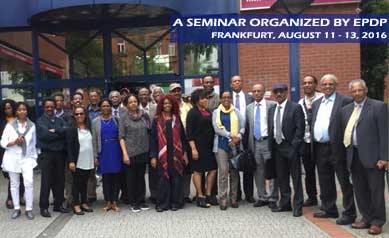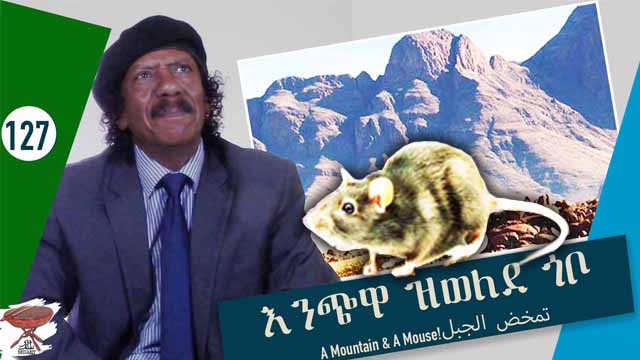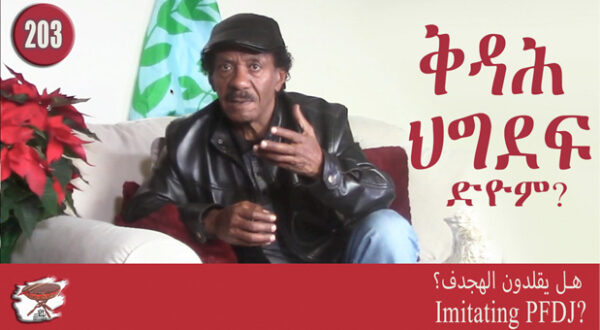Amidst Trust-Builders and Rumormongers

In its attempt to defeat and end the totalitarian rule in Eritrea, the resistance media disseminates opinion and editorials to expose the regime, to convince its misguided supporters to abandon it, and also to provoke debates on national issues. Its main goal, however, is to empower Eritreans by providing them with news and analysis so that they can take informed decisions and be aware of current events that affects the struggles that they are waging.
Trust Building is not a prominent component of the job description of a news and opinion media outlet. Nonetheless, that should not be understood to mean that media outlets do not have the ability to promote, or damage and hinder efforts aimed at trust building.
In the Eritrean case, there are media outlets dedicated to entertainment, to agitation, to advancing primordial viewpoints, and even to defend the Eritrean totalitarian rule. Somewhere in the middle are propaganda outlets, partisan outlets, tabloids, college bulletin board type outlets without clear missions, and others. But generally, the Eritrean media characteristics range from outlets of exemplary altruism that advance liberal, progressive ideas in defense of the rights of their people, on one side, and parochial, divisive, and reactionary outlets on the other.
There is certainly a space, and an ingredient in the core message of journalism which could help advance “Trust Building” among components of a society, or among social and political actors. And that could be accomplished either through content dedicated to the topic, or subtle messages that are delivered piggybacked with other contents—I believe it is in this context the organizers of this seminar assigned the topic to me. However, I intend to speak about Trust Building in general terms.
My dear allies….
I would like to thank the EPDP for organizing this seminar and for giving me the opportunity to be part of it—I thank everyone who was part of it.
Usually some stories are attributed to Plato, Socrates, Abu Nawas and others, and I will tell you one such story whose source is lost in translation, and in modifications of the original. But based on a little research, it seems the story I will tell you is originally from the old Arabic literature.
A village shepherd used to herd his goats close to a trail outside his village, and he would sit under a shade of a tree on a mound surrounded by the sound of singing birds and bleating goats. For the rest of the day he played mesmerizing flute tunes that made the village women stop doing what they were doing to listen to him, and made travelling men stop by to enjoy the tunes of the flute. However, to his dismay, with the passing of time the shepherd’s flute was not as captivating as it used to be; the villagers hardly noticed the tunes though he continued the lonely ritual of playing his flute.
One day a traveler passing by the village noticed him; he stopped to listen to him admiringly. He was so captivated by the melancholic tunes that he asked the shepherd if he would travel with him to a far place where he would be paid for playing. By then, the shepherd had realized his talent was not being appreciated in his village anymore; he didn’t hesitate in accepting the offer and that same day he left with the stranger. The shepherd toured many villages where crowds paid to listen to him play, he became a famous flute player and earned a considerable amount of money.
Nevertheless, after staying away from his village for many years, the shepherd became nostalgic and decided to visit his village. His manager was not keen on the idea and tried to dissuade him—that his old village didn’t appreciate his talents and he shouldn’t go. The flute-player was adamant and returned to his village expecting a warm welcome. Sadly, there was no warm welcome, but enough curious people came to see him; he has changed in many aspects: well-dressed and wealth radiated from his face. The flute-player teared up with happiness when he saw his people. He immediately took his flute out and started to play for them. When he finished playing, he looked around expecting cheering and clapping similar to what he was used to in the other places where he played; there were none! Only his manager cheered and clapped for him while the rest moved away uninterested.
Observing his sadness, the manager remarked: “son, zemaar al Hay la yeTrib”.
That is the source of the Arabic saying: لا عيب لي غير أني من ديارهم وزامر الحي لا تشجي مزامره
“Nothing is wrong with my playing except I am from their neighborhood; the tunes of a neighborhood musician is not delightful.”
In Tigrinya there is an equivalent saying: Nediaa gedifaas habtenoaa tnafiq [missing an aunt instead of a mother].
The flute player was so sad that he contemplated about throwing away his flute, and stopping his creativity because the flute he liked so much is not appreciated anymore—the tunes he played in his neighborhood were not delightful anymore.
Dear allies, I am from this neighborhood, and I am afraid that what I say about trust building might not be delightful. Therefore, I will speak about the things that don’t build trust—if I convince you to think of the possible opposites of what actually damages trust, you can arrive at what builds trust on your own.
Let’s begin with RUMORS, they do not build trust! Knee-jerk reactions do not build trust. Being paranoid and suspicious of everything that reaches your ears doesn’t nurture trust. Stop that and you will be on your way to building trust.
If some people from your neighborhood are playing captivating tunes, on the flute, reject them at your own peril. On the other hand, if someone is playing something else and trying to tell you it is the tune of a flute, be careful not to be taken for a ride. Reject lies and rumors, better yet, challenge them, even better, buy earplugs.
As you are all aware, in the context of our struggle, building trust is not an end in itself, but a means to promote cooperation in order to achieve total liberation for our people. Anything that would not contribute to the advancement of our struggle, however noble or vital it might sound, should not deceive us by its false glitter. It’s a pretend flute. There! Talking about trust building, and over-analyzing it might make us forget why we need that TRUST in the first place–google would turn dozens of links on the topic of “trust building,” but that would not help our problem unless we internalize, and personalize trust building.
I believe that trying to address such conceptual issues in a political setting is not a good idea; it is an academic, intellectual topic that should be addressed by intellectuals—only those who are qualified and honorable, those who have an impeccable track record. It’s important to remember that being members of the opposition doesn’t give us an automatic knowledge or skill to address intellectual topics. Parties should outsource such topics to qualified people so that they can focus on building their parties—to draw strategies and devise tactics on how to defeat the PFDJ regime, to spend time on creating (or expanding) robust diplomatic networks, to create intelligence gathering cells inside Eritrea, to penetrate the system—focus on the core tasks of a political party, aspects of the struggle on which we are mortally weak. In short, I suggest that political parties create independent units and assign the task to intellectuals who do not consider the struggle a summer pastime. Let such a unit handle intellectual matters while the politicians of the party strictly focus on the issues I mentioned above.
Rumormongering is the worst enemy of trust building; most of you in this room have been toiling for decades, regardless of the result you produced, and now you are targets and victims of rumormongering, isn’t it so? Isn’t what you do a thankless job, though not many are expecting a ‘Thank You’ for doing what their conscience tells them to do? This struggle should not be downgraded in stature to a commercial venture. It is not. It should remain a lofty and noble endeavor to satisfy the conscience, to remain true to the Eritrean ideals, to remain true to our people, and to those who paid the ultimate price while pursuing freedom and justice. We should not allow rumormongers to defeat our pride, to disorient our sense of right and wrong.
Does anyone question that a manual-laborer at a construction site sweats and works as hard as possibly imaginable? Does anyone question that whatever the laborer does, most likely he will never make ends meet? Then, would it be fair, or acceptable, for a lucky chap sitting on his behind all day to belittle the sweat and toil of the manual-laborer? How about you all? Yesterday you were shifta, outlaws, good for nothing blocks, and today you are the same!! Have you encountered more bitter and unfair characterization than that? Worse, are we not the victims of the evil elements who relentlessly defame our patriots and veterans? They do it through rumormongering:
The bible tells us: “You shall not spread a false report. You shall not join hands with a wicked man to be a malicious witness.” Exodus 23:1
And the Koraan tells us:
يَا أَيُّهَا الَّذِينَ آمَنُوا إِنْ جَاءَكُمْ فَاسِقٌ بِنَبَإٍ فَتَبَيَّنُوا أَنْ تُصِيبُوا قَوْمًا بِجَهَالَةٍ فَتُصْبِحُوا عَلَىٰ مَا فَعَلْتُمْ نَادِمِينَ
“O you who have believed, if there comes to you a corrupted person with information, investigate, lest you harm a people out of ignorance and become, over what you have done, regretful.” al-Hujurat 49:6
Rumor is only one of the examples of a practice that doesn’t help build trust, in fact, it is the main culprit of disarray. All the causes of the damage to our unity, for our lack of cohesion, for our mutual mistrust, for the despicable unenlightened rivalry, has one culprit: rumormongering. However, it’s a blessing we do not have to feel guilty for failing to build trust with the rumormongering camp that constantly sows seeds of discord among patriots—this is the camp that we have to fight and win over.
Once upon a time a man came running to a notable shum in a village and said, “sir, I heard some people talking; I came to tell you what they said about you.”
The shum: “before you tell me anything let me ask you three questions.”
The man nodded in agreement.
“Are you certain that what you intend to tell me is true?”
No, I am not sure of that.
“Is what you intend to tell me good; will it please me or please you?”
No. To the contrary; it will not please anyone.
“Is what you intend to tell me beneficial to me in any way?”
No. It will not benefit you in any way.
“Then, if you are not sure whether what you intend to tell me is true or not; you say It’s not pleasant, and not beneficial–why would you be bothered to tell me at all?
The shum is merciless in dealing with rumormongers, wouldn’t you agree? Maybe we should imitate that kind of bold behavior and learn to scrutinize before we become accomplices in spreading damaging rumors. Rumormongers should be embarrassed and humiliated in that manner. And we should follow the golden rule: “If you spread information, be sure of its correctness; if you’re claiming something, make sure you support it with evidence.”
Over the years, many people urged me to help in starting a journalists’ union or association, something to fight the loose and destructive reality of our activist media. Sadly, it has become a nightmare as far as trust building is concerned, and I have been resisting the urging because: 1) I do not believe the media outlets should unite or coordinate but compete for excellence, 2) the opposition camp should build other means of struggle instead of mainly depending on the over-rated media outlets.
The Eritrean media space is now saturated, in fact it has become a nuisance—how about taking a break from the media and focus on building a strong diplomatic presence, for a change, maybe establish well-organized, professional associations, or build civil societies instead of the hodge-podge of associations, though I advise against duplicating the schizophrenic diaspora “civil societies” that are torn apart between loyalty to Eritrea and loyalty to the adopted country.
Establishing an empty shell of a media outlet has become the easiest project for many aspiring activists who aim high, without being prepared to provide what it takes to have more than a me-too news outlet. Instead of convincing Eritrean media outlet managers to help in trust building, I would rather have media outlet managers commit to a Covenant of Honor that would restrain the managers from committing mistakes; once accepted, the covenant can be continuously improved with input from the public that would be able to judge the performance of the media outlets using the covenant as a yardstick, and based on that, the public could either support or denounce any media outlet.
But then, what is media?
“The phrase ‘media’ began to be used in the 1920s. Books, newspapers, magazines, records, tapes, (now digital files) cinema, radio, podcast and anything that can be delivered through the Internet—including cell-phones which are the strongest media, it is no more the two-way communication device as it was intended to be when it was first used in Japan in 1979 and it took almost two decades for that to become a mass media distribution.”
A brief googling about media returns so much information. For example, a Wikipedia entry states that the first downloadable ringtones were introduced in Finland, in 2007… over 8 billion dollars was spent on mobile music: ringing tones, karaoke, music videos, music streaming services etc.; 31 billion dollars worth media was consumed on mobile devices; over 5 billion dollar of mobile gaming; and various news, entertainment and advertising services… E-mail on the internet, and SMS text messaging is used by over 5 billion people. Mobile devices are more powerful media than either TV or the internet, because they are permanently carried and always connected.
And this data is several years old! It’s amazing how all this revolution started with, “Gutenberg’s masterpiece, and the first book ever printed in Europe from movable type, is the “Forty-Two-Line” Bible, completed no later than 1455. Gutenberg died in Mainz in 1468.”
“The first high-circulation newspapers arose in London in the early 1800s, such as The Times and were made possible by the invention of high-speed rotary steam printing presses, and railroads which allowed large-scale distribution over wide geographical areas. That was the birth of mass media, but the increase in circulation, led to a decline in feedback and interactivity from the readership, making newspapers a more one-way medium”—and imagine, people were complaining about that! They were lucky; what would they say if they knew of those who didn’t go through newspaper and radio, but opened their eyes straight to social media?
Now, where does that leave Eritreans?
The technology is out there; we are part of the global development in that aspect. Though we have a monopolistic control freak government ruling Eritrea, soon it will be difficult even for a totalitarian government to control people’s access to mass media—imagine when communication required physical wires that connected consumers to a hub. Now the world is connected without being physically connected. Soon, technology will be affordable but too sneaky to be controlled, and no one entity alone will have the power to promote trust or otherwise. I believe it is easier, and more practical, to address and focus on solving what creates mistrust in the first place instead of expecting a solution from the media, the humble Eritrean media at that: under-funded, under managed, and too partisan. Unfortunately, Eritreans treat their media as if it were Sindbad’s flying carpet that can transport and deliver the rider straight to a seat of authority. Honestly, not many trust media outlets that serve those who control power or aspire to do so—political parties included.
Depending on the media to build trust!
I am not ruling out some positive contributions by the activist media in building trust, but I am just recognizing its very modest contribution. If you notice, most rumors are created on social media, and most hate-mongering and trust damaging messages are released on social media. No doubt it is a wild forest out there, no regulation, no accountability and no transparency. People who risk nothing and have nothing to lose, using pseudonyms, are wreaking havoc to our national discourse, egoists are disrupting and confusing our communications and debates, just for a moment of fame—and many want to ride the delusion of social media numbers games.
Recently I read a study that was spread all over the world in May 2015, and that succinctly illustrates the state of the media and journalism: a certain John Bohnnon created a fake story claiming that Dark Chocolate helps in weight-loss. He published a fake finding in a shoddy journal, and in no time journalists picked the story which went viral and became a sensation. In the process Bohannon proved how lazy the media has become—not many scrutinize or verify the stories they disseminate! The chase for filler content is a 24/7 affair, there are empty slots that has to be filled with anything, regardless of how confusing, how damaging, or how untrue the fillers are; sometimes it is all fillers, no news. Worse, insignificant but catchy phrases are promoted as Breaking News to create a sensation, and Breaking News has become a favorite slogan of the Eritrean corner of social media—the den of the copy-cats. It is in this distracting and damaging situation that some are operating and trying hard to stay focused.
Last year a news item created by a facebook account, a nickname, got a life of its own and people posted and cross-posted it to death. A few months later, news that the UAE and Saudi Arabia were building a base in Assab got another life of its own and to this day it is being posted and cross posted as a fact, even the Ethiopian PM reacted to it seriously. In some circles, that news is still considered a non-questionable fact and more of that is unfolding as we speak.
The Media Of The Youth
Social media was sneakily promoted as a medium of the “youth”; the old are considered not savvy enough for it, old fashioned—and I remember “Myspace” whose fate might visit facebook though it is unlikely facebook will be considered passé anytime soon. But these days the young are into Instagram! Social media is a wild race that no one would be able to match its speed—it is like chasing phantom goals, an illusion.
Before I conclude, let me share with you what I read on Time Magazine: a study published in the Journal of the Royal Society Interface scientists have found that whilst mass connectivity through social media and the internet makes us look smarter it might be making us stupider. Read more at: Is social networking making us stupid?
“Whilst some commentators say the internet is making us stupid and others say it’s helping us make more informed decisions the scientists behind this study say that they might both be right. Being able to copy from other people in vast networks means analytical responses rapidly spread, fulfilling their promise of improved decision-making for well-connected people. ‘On the other hand, the bias may very well decrease the frequency of analytical reasoning by making it easy and commonplace for people to reach analytical response without engaging analytical processing’ say the team, and this tendency to copy without thinking ‘can explain why increased connectivity may eventually make us stupid by making us smarter first’.”
Dear colleagues, if by now you haven’t figured out what my speech is all about, I am claiming that we can successfully build trust if we shun and successfully defeat rumormongering—the most lethal culprit.
Thank you




Awate Forum